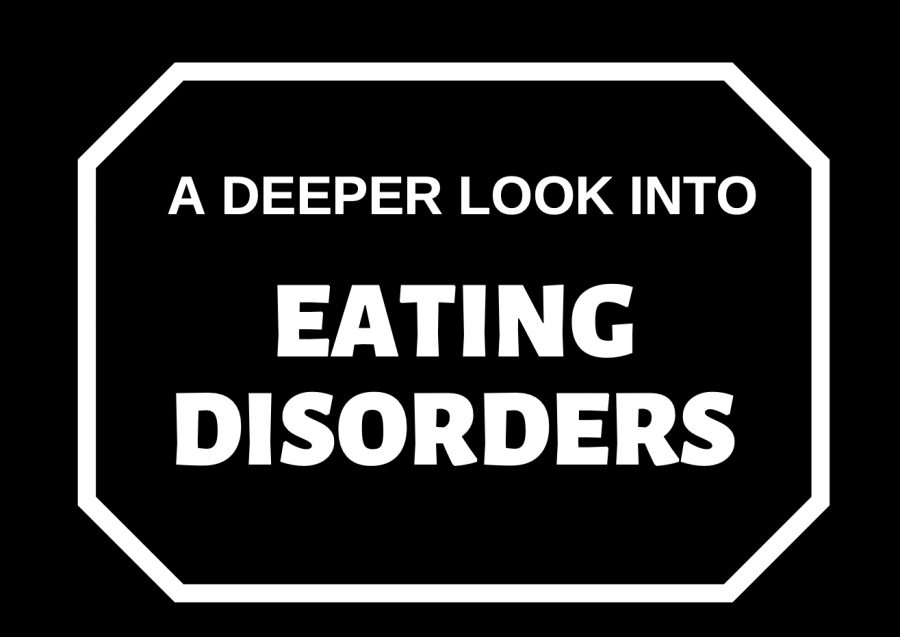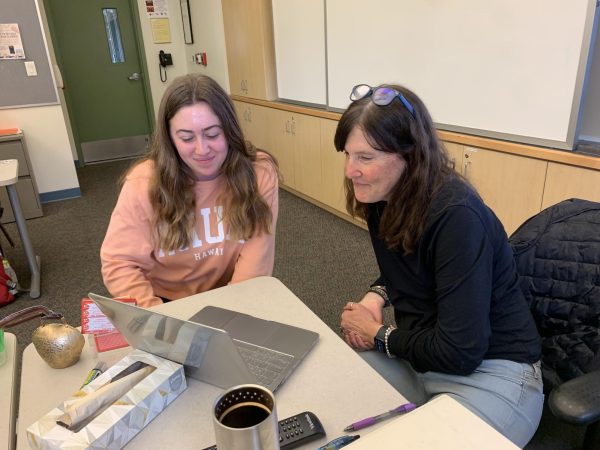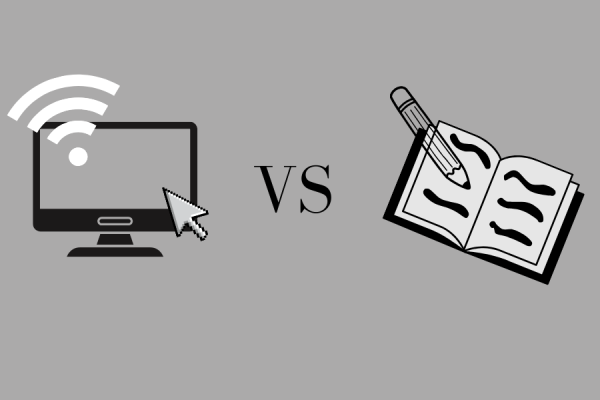A Deeper Look Into Eating Disorders
January 26, 2021
Millions of people around the world experience troubles with eating and think nothing of it. However, eating problems are serious and can turn into a full-blown eating disorder. Some eating disorders are more severe than others, however, no mater the severity, it is very important to deal with the disorder. This package will talk about the different aspects of an eating disorder and how to remain healthy.
What is an eating disorder?
Throughout generations, people have struggled with eating disorders, whether it be anorexia, bulimia, binge-eating, restrictive food intake disorder (ARFID), rumination disorder or countless other types of disorders. Unfortunately, in today’s society, social pressures of body image is one of the largest contributors to peoples’ suffering. Though many cannot see it, eating disorders do impact one’s emotional and mental health, rather than solely their physical health.
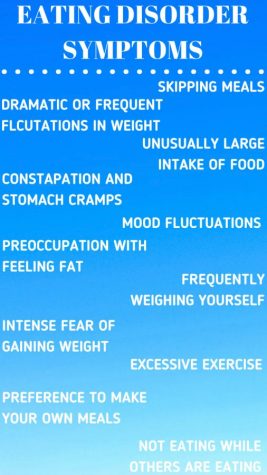
Most eating disorders are based upon the desire to lose weight whether it be through the act of starving oneself, or purging to then follow-up by vomiting. Most often, eating disorders are developed amongst teenagers and young adults as they are easily manipulated by tabloids, magazines, influencers, and other sources that can make them feel ugly because of their weight.
Today, there are many misconceptions about eating disorders and how they impact one’s life. Just because someone does not look thin, does not mean that they do not suffer from an eating disorder. Just because you see someone eat in front of you, does not mean that they do not suffer. Just because someone tells you that they do not suffer from an eating disorder, does not mean that they do not. Oftentimes, some of the people struggling do not realize how severe their condition has become. It starts off with making healthier lifestyle choices like eating healthier or going to the gym, but quickly thereafter, it can become an obsession for some. People with eating disorders can look at themselves after a long time of dealing with their disorder and very obviously look unhealthy and lacking nutrition, and still see themselves as “fat” and “ugly” in the mirror.
According to the National Institute of Mental Health (NIMH), anorexia nervosa, bulimia nervosa and binge-eating are the most common types of eating disorders. The Mayo Clinic describes anorexia nervosa as occurring in people who show signs of abnormally low body weight and an extreme and constant fear of gaining weight. People struggling with this condition go to extreme lengths to ensure that they stay thin and they do this by starving themselves, calorie counting, and exercising themselves to the point where in some cases, you can find bruises along their spines due to the excessive amount of sit-ups.
Bulimia nervosa is a condition described by the Mayo Clinic in which there is a lack of control over one’s eating that leads to purging, followed up by the act of vomiting to rid oneself of the calories. Bulimia can occur in episodes where one person can purge for hours, and spend a large amount of time thereafter, vomiting and restricting themselves. Contrasting to anorexia where one may appear to be abnormally thinner than the average weight, someone with bulimia may appear to be of average weight or even a bit overweight, making it difficult to look for the common signs.
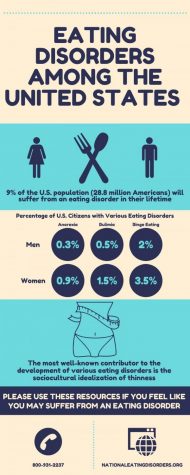
Binge-eating disorder is defined as an instance in which people often eat excessively, but do not try to compensate for it like in anorexia or bulimia. Instead, one who struggles with this disorder prefers to eat alone, eat when they are not hungry, and continue eating even after they are full. Because one does not try to compensate for their weight in this particular disorder, people who have a binge-eating disorder can be of normal weight, or in most cases, slightly overweight. Though shame and guilt are a large factor of all eating disorders, in a binge-eating disorder especially, these same factors along with embarrassment are intensified and a large contribution in why these people prefer to eat alone.
Eating disorders are never planned, even though one’s intention may have originally been to lose or gain weight. Some causes of eating disorders are natural, like genetics, and others include the individual’s physiological and mental health. Many do not consider that eating disorders are physiologically harmful as well. People suffering from eating disorders usually have an extremely negative mental health prompting depression, anxiety, social problems, any kind of substance abuse and in the worst cases, it can lead to suicidal thoughts. In fact, eating disorders often come along with other mental illnesses like anxiety, OCD, depression and other disorders according to the National Eating Disorders Association (NEDA). Moreover, they stated that ⅔ of people that are diagnosed with an eating disorder like anorexia, showed signs of anxiety several years before their eating disorder started.
The most serious physical complications of eating disorders include damage to the heart, bones, reproduction system (infertility), mouth, jaw and teeth. Some less serious symptoms of eating disorders include swelling in the mouth, brittle hair, yellow or dry skin, loss of energy resulting in dizziness and fainting, feeling cold, stomach pain, weakness and a variety of other things.
Eating disorders, although over time can be treated, are not illnesses that can disappear and never come back. Unfortunately, approximately 35% of people who have undergone treatment for an eating disorder have reported a relapse after their treatment as claimed by the eating recovery center. Understandably, it can be stated that while in some cases, eating disorders may not be a lifelong illness, many people who have suffered in the past from eating disorders are much more likely to have a relapse or redevelop and illness alike even 10 years after their original diagnosis or even treatment.
Notably, people who suffer from eating disorders have a large portion of their life taken up by their own thoughts and eating habits, though it is important to know that eating disorders do not define who someone is. It is merely a part of who they are and what they have gone through and still may be going through. Fortunately, there are many resources available to provide not only short and long term solutions, but tools to ensure people who suffer from these disorders can lead happy and fulfilling lives.
Psychological aspect of an eating disorder
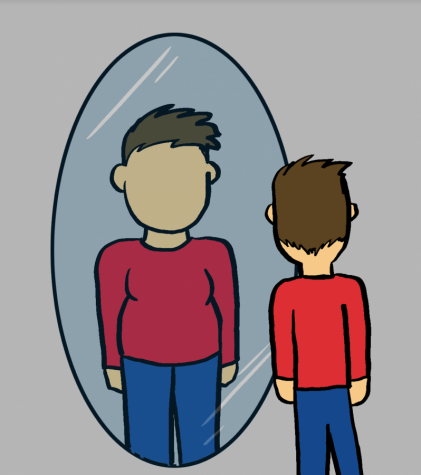
One of the factors that make a person more likely to develop an eating disorder is the way that their brain is structured and functioned. There are specific neurobiological differences in the brains of people with eating disorders such as anorexia, bulimia, or binge eating disorder. Investigating the role of neurotransmitters has led scientists to link a person that has an eating disorder with their own biological makeup.
In the brain, there are neurotransmitters (chemicals that transfer information between neurons which are nerve cells) . In order to process and receive messages signaled by the brain, neurotransmitters must bind to a specialized protein called a receptor that is a “perfect fit”.
Neurotransmitters use their specific receptors on a neighboring neuron to transfer encoded information. One can think of this almost like a magnet where one neuron must transfer information to another through specialized receptors in order to propel encoded information to successfully pass down a message. However, variations in shape and number of receptors that neurotransmitters attach to, can lead to misinformation and cause mental illnesses. The two main neurotransmitters associated with eating disorders are serotonin and dopamine.
Variations in the serotonin receptor cause people with ED’s (eating disorders) to have a below-average level of serotonin because of ineffective communication between the neurotransmitter and its receptor.
This decrease in serotonin, however, actually increases the number of receptors in order to utilize the remaining serotonin levels. Therefore, even people who are struggling to recover from an eating disorder find it difficult as their body has already adapted to low serotonin levels in order for them to maintain stability. Without adequate support, the person in an ED who is trying to recover can experience symptoms of anxiety and OCD because of the influx of serotonin levels produced as food enters the body.
Additionally, people with binge eating disorders, such as bulimia nervosa also experience low levels of serotonin due to insufficient diet that again spikes up when they consume an excessive amount of food that leads to a chain of impulsivity and control loss. Without a doubt, in order to hinder possible causes of other mental disorders through recovery, people in relation to the person struggling with an eating disorder must commit to being a strong support system.
In contrast, people with anorexia have a surplus of dopamine- the neurotransmitter linked to motivation, reward, and memory- which replaces the surge of dopamine released by consuming food when hungry. Once again, the body’s natural incentive is to keep dopamine levels high as a response to lacking dopamine that usually happens when eating.
One should always keep in mind that biological abnormalities can ensue a difficult road to recovery in those who struggle with eating disorders. Therefore, sensitivity and awareness about other mental factors that lead to a certain eating disorder should continue.
Nutritionist speaks her thoughts on eating disorders

As eating disorders vary in severity and diagnosis, it is difficult to pinpoint the best or most common method of treatment. Tabitha Zoltak, both a licensed dietitian and nutritionist as well as an employee at Genesis HealthCare, described how she guides struggling patients towards a more healthy direction.
As a 1996 NYU graduate, Zoltak has been working with individuals with eating disorders since her first internship at the Philadelphia Renfrew Center in 1997. Zoltak explained how there is no specific method she uses, as every individual is different.
“Every patient is different so the whole thing is to teach them safe eating habits as well as food myths, misconceptions and foods’ importance to the human body,” Zoltak said.
In her practice, Zoltak works alongside nurse practitioners, medical directors, and speech pathologists. 10-15% of Zoltak’s practice is filled with patients who are struggling with an eating disorder. Therefore, she also specializes in other medical conditions, such as diabetes, renal disease, and obesity.
When asked how she might describe someone with an eating disorder, Zoltak explained how it is very challenging, due to the fact that an eating disorder is not definitive, but rather individualized.
“A lot of it is behavior. I can teach someone how to eat healthy, but it’s mostly a psychological condition of battling with your mind,” Zoltak said.
When a patient presents themselves, Zoltak’s role is to set appropriate boundaries and decide on the best way to help him/her. For example, she might reinforce medically related decisions regarding exercise or meal plans.
Throughout Zoltak’s years as a dietitian and nutritionist, she has not seen a high number of people find success in beating their eating disorder. Despite this, she did have a couple of patients that she discharged. These patients were able to direct their focus that was once on their disorder, elsewhere.
“I’ve seen more that are unsuccessful because it is a disease that doesn’t go away,” Zoltak said.
She explained how most people struggle to take care of their body and become healthy. Hence, the method or plan in which she chooses differs for the person she is helping.
Eating disorders are a very complicated disease and are different for everyone who faces one. However, the best way to deal with an eating disorder is to immediately get help and try to make a change.
Components that make up a well-balanced meal
Eating disorders should not be glorified
People thrive off of gratification. By the time a child enters elementary school they are primed to think that good behavior equates to a good person. Some teachers award students that perform well on difficult tests with gold stickers. So then evidently, why wouldn’t people expect this mentality to continue through other obstacles in a growing teenagers’ life? As they step on the scale and their number drops by a few pounds, why wouldn’t the teenager feel a subconscious sense of accomplishment? If a teenager is distracted by other implications in his or her life, why wouldn’t we expect them to be prideful of skipping a meal? After all, many teenagers feel the media has glorified unhealthy eating habits to a certain degree, and hasn’t our generation grown up on social media?
In my opinion, teenagers are undereducated about eating disorders. Yes, we may cover the topic as a whole in health for a unit but I personally do not think many of us truly understand the severity of eating disorders. By only teaching high school students the cookie-cutter definitions of “anorexia” and “binge eating”, there is a missed opportunity for students to understand the importance of healthy eating habits as opposed to just memorizing terms for a test. In addition to the lack of proper education on this topic, social media heightens the struggles for many teenagers.
Social media influencers use their platform to show off whatever hope will please their audience in order to maximize the number of their followers. A recent issue with the media that I’ve noticed does not directly pertain to social media influencers. Take the Kardashians for example. It has been acknowledged that influencers such as the Kardashians – who have what society may view as a “perfect body”-often post pictures of themselves. To many people, these posts make the viewer feel insecure in their own skin. But everyone that feels this way has the option to unfollow or block these influencers. This option will hide the social media influencer’s posts from the user’s feed. Nonetheless, there has recently been an increase in body shaming through new apps such as Tiktok. While there are some creators that strive to promote body positivity, they are sadly overlooked by the amount of negativity I find on my randomized Tiktok feed. If a person who appears a bit larger posts a video on the app, I can expect the comment section to be filled with a mix of negative responses and backhanded compliments. There is a drastic difference between saying that someone is confident and saying that someone must have a lot of confidence to post a video like the one they are seeing.
Tikok among many other beloved platforms have instilled the belief that commenting on the way you view other people’s bodies is acceptable. Some people may share the opinion that this is helpful in reminding people how they can be healthier. Personally I was brought up to never comment on someone’s body in a possibly negative manner, even if that can nudge them in a healthier direction. Tons of people, especially teenagers struggling to find themselves, have a long list of insecurities bottled up inside of them. Even small remarks about someone’s rib cage popping out or someone putting on a few extra pounds could completely alter that person’s mental state. I think it’s important to try to be mindful of others because no one knows the full extent some people may be struggling internally to accept themselves.
If a person who appears a bit thinner posts a video on the app, I can expect the comment section to be filled with self-deprecating remarks such as, “I am never eating again” or “I’m not hungry anymore”. I find that users either find it comforting to make comments on the person’s body in a negative manner or to condemn their own body in comparison to the one shown before them. This new situation is difficult to prevent because unlike the past when insecurities surfaced from social media influencers’ posts, it is now a common occurance to see body shaming on the average person’s tiktok. Body shaming has become so normalized through Tiktok, that users can not even keep up with blocking or unfollowing specific accounts to avoid these comments.
Tikok among many other beloved platforms have instilled the belief that commenting on the way you view other people’s bodies is acceptable. Some people may share the opinion that this is helpful in reminding people how they can be healthier. Personally I was brought up to never comment on someone’s body in a possibly negative manner, even if that can nudge them in a healthier direction. Tons of people, especially teenagers struggling to find themselves, have a long list of insecurities bottled up inside of them. Even small remarks about someone’s rib cage popping out or someone putting on a few extra pounds could completely alter that person’s mental state. I think it’s important to try to be mindful of others because no one knows the full extent some people may be struggling internally to accept themselves.
Social media has fundamentally changed the way teenagers view their bodies but it has also glorified unhealthy eating habits. On platforms, for example on Tiktok, users often post “what I eat in a day” videos. In many cases, the portion sizes they show are unbelievably small and some just skip meals altogether. Regardless, the users posting these videos think little of the repercussions of their post, standardizing unhealthy amounts of food. Personally, I can attest to these videos making viewers compare our own portion sizes with the ones shown. The most dangerous part is that we don’t even realize we make these comparisons as often as we do.
I wanted to incorporate some of my personal beliefs into this story because while I am fortunate enough to not have any experience with an eating disorder, I am a teenger living in the 21st century with social media. I have witnessed social media negatively impact me and those I surround myself with in relation to highlighting our insecurities. It is normal to feel this way every once in a while. However, if these insecure feelings develop into a change in eating habits, please follow the steps listed in this multimedia package about how to stay healthy. It is also important to hold yourself accountable and not justify not eating for an entire day with excuses. Food fuels the body so it is important to nourish it the proper way and make time for what is important. To all the readers currently struggling with an eating disorder, know that no one is discrediting how much you are struggling, and small progress is still progress. Even if you are gradually working towards your goals, make sure you have goals set in place and are striving to lead a healthier lifestyle.
My personal journey with losing weight
“Wow,” the doctor said, “you’ve lost 15 pounds.”
This sentence was among many sentences uttered at my sixteen year check up. It had come to my attention that my weight had gone down to my weight from when I was twelve. You might be asking, was it from working out? Dieting? Natural remedies? No, it wasn’t, sadly. I had gotten to that body size and weight from starving myself.
I noticed that in January, I just did not feel like eating. It felt like a chore more than a joy. I blamed this on schoolwork and the school’s time for lunch, as it felt like a late breakfast. From this, I was down to eating two meals a day. This truly did not affect my school and sports performance, so I decided to continue this awful habit for a few more months.
Whenever my girl group sat at lunch, only one friend noticed that I did not eat anything. Whenever we had those uncomfortable yet unavoidable talks about calories and our weight, I brought up the fact that I lost fifteen pounds from doing nothing and they thought I was “lucky”.
No, I was not lucky, and in a way I question my friendship with them for not seeing anything happening to me.
From January to March, I hated eating anything. It literally felt like a burden on my body. I saw it then as a plus: my waist was snatched, my weight was low, and I didn’t have to spend extra time eating.
Once quarantine started, I felt more depression and anxiety than I ever could have imagined. This was due to cancellations of activities, no social contact, and everything else that a fifteen (almost sixteen) year old would experience. I locked myself in my room, did homework, and went on my phone. I was so upset. Food physically could not go into my body.
However, one thing in particular is completely thrown off from this disgusting eating habit. My menstruation cycle, or period, was just wrong. I got it every two weeks for about four months and it was the worst thing in the world.
My mom at that sixteen year checkup was horrified, as she did not really notice anything. I think for her, she did not see a sudden change, since it was was more gradual and therefore did not stand out to her. On Memorial Day, we went to see my grandmother, aunt, uncle and cousins; when my grandmother saw me, she told my mom how much weight I had lost. This was not the usual grandparent intuition which led to stuffing me ice cream. It was real, and it was a problem to her.
My mom finally realized my new body and just how much it had changed. She kept me on an eating schedule and practically forced me to eat until it felt natural again.
Now, I choose to work on my body solely through exercise. I am able to eat again, which relieves me.
I advise you to think about any friends or family members who you have not seen in a while and check up on them. If you see your friend not eating, try to persuade them, it will most likely work.
I wish I had a friend or family member who noticed in the first months so that I wouldn’t fall down this dangerous path. In a way, it is a blessing because now I can help others not do the same thing I did to my body.
My ongoing battle with food
Growing up in a society where everyone is judged makes life a little hard. Plus, it doesn’t help being surrounded by toxic diets. That is what triggered me. All throughout my life, I struggled with my weight. I was really skinny at times, but I also had times where I was overweight. I was not one of those lucky girls who had an amazing metabolism and could eat whatever I wanted. I was one of those girls, where eating one thing with a little extra calories would make you fat. Not literally because that is not possible, but you get the idea. I never realized when I was fat or when I was skinny until the end of middle school. At this point, my doctor and mom made me go on a diet to see if I was “ lactose intolerant.” This triggered my spiral and I now call it an excuse that I used to stop eating. From there, my mental state went down and I started eating wrong. Yes, I was healthy and three months later, I lost 20 pounds, but that was not where it stopped. I started to binge eat and starve myself until I felt nauseous. That was my reward and competition (let’s see how long I can go without eating). The sad thing is that nobody noticed, but to me it was constantly on my mind. I started staring at myself 24/7 and comparing myself to models and others. Being a dancer, I was always aware of the stereotypes. You are there for people to stare at your body and critiqueit. With all of these factors affecting me, I was gone.
Going into life and especially high school with this mindset, only made things worse. I was not the only one judging my body, so was my mom. She kept this dysmorphic life on. I tried every diet and evey “magical” drink there was. After a while, my mind changed. The thought of food became less horrible and scary. I still loved food, so the binging became worse, and for that I actually started to eat again. Except after a while I realized this was not how life was supposed to be. I started to love myself and realized “food is fuel”. Food is there for a reason and binging is always going to be an issue for me, but I am willing to fight it because life is supposed to be amazing and beautiful. If I am going to live the life I want, then I will have to be careful, but also careless. We are all different, but there is no reason why you have to hurt your body for other people. Eating disorders are no joke, and they will get better. But one thing to remember is there is always a healthy way to do things. For me, yes I had a long journey but now I am at the end of the tunnel and let me say… It is amazing!
This story was originally published on Eastside on December 7, 2020.



























![IN THE SPOTLIGHT: Junior Zalie Mann performs “I Love to Cry at Weddings,” an ensemble piece from the fall musical Sweet Charity, to prospective students during the Fine Arts Showcase on Wednesday, Nov. 8. The showcase is a compilation of performances and demonstrations from each fine arts strand offered at McCallum. This show is put on so that prospective students can see if they are interested in joining an academy or major.
Sweet Charity originally ran the weekends of Sept. 28 and Oct. 8, but made a comeback for the Fine Arts Showcase.
“[Being at the front in the spotlight] is my favorite part of the whole dance, so I was super happy to be on stage performing and smiling at the audience,” Mann said.
Mann performed in both the musical theatre performance and dance excerpt “Ethereal,” a contemporary piece choreographed by the new dance director Terrance Carson, in the showcase. With also being a dance ambassador, Mann got to talk about what MAC dance is, her experience and answer any questions the aspiring arts majors and their parents may have.
Caption by Maya Tackett.](https://bestofsno.com/wp-content/uploads/2024/02/53321803427_47cd17fe70_o-1-1200x800.jpg)
![SPREADING THE JOY: Sophomore Chim Becker poses with sophomores Cozbi Sims and Lou Davidson while manning a table at the Hispanic Heritage treat day during lunch of Sept 28. Becker is a part of the students of color alliance, who put together the activity to raise money for their club.
“It [the stand] was really fun because McCallum has a lot of latino kids,” Becker said. “And I think it was nice that I could share the stuff that I usually just have at home with people who have never tried it before.”
Becker recognizes the importance of celebrating Hispanic heritage at Mac.
“I think its important to celebrate,” Becker said. “Because our culture is awesome and super cool, and everybody should be able to learn about other cultures of the world.”
Caption by JoJo Barnard.](https://bestofsno.com/wp-content/uploads/2024/01/53221601352_4127a81c41_o-1200x675.jpg)




